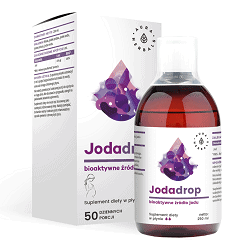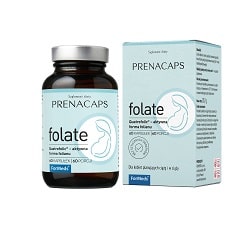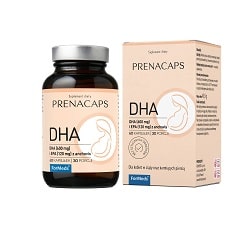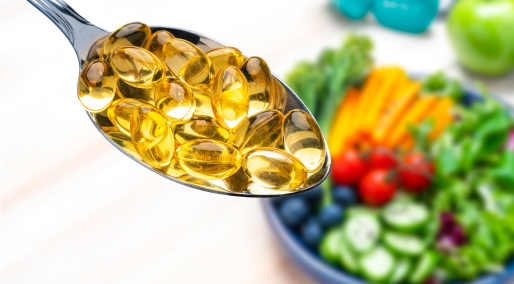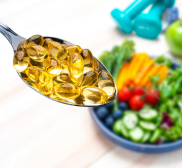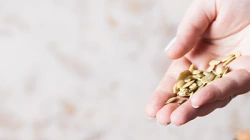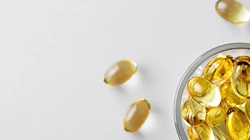.webp)
.webp)

Patryk Chodyniecki
Lactation, an amazing time for women and children
- LACTATION, AN INCREDIBLE TIME FOR WOMAN AND CHILD
- WHAT VITAMINS DOES A BREASTFEEDING WOMAN NEED?
- IT IS WORTH PROVIDING ALL VITAMINS WITH YOUR DIET
- VITAMINS FOR BREASTFEEDING WOMEN
- WHICH SUPPLEMENT TO CHOOSE FOR WOMEN WHILE BREASTFEEDING BREASTFEEDING?
- HOW IS IT WITH VITAMIN D DURING LACTATION?
- OMEGA-3 (DHA) DURING BREASTFEEDING
- IODINE AND BREASTFEEDING
- FOLIC ACID DURING BREASTFEEDING
LACTATION, AN INCREDIBLE TIME FOR WOMAN AND CHILD
For both the baby and the mother, breastfeeding is one of the most important times of the year. most important. Then both people get to know each other or simply spend more time together. However, it is important to note that this is when many ingredients and nutrients are delivered to the child's body. For this reason, it is necessary to take care of proper supplementation. Additionally, in milk there are bioactive compounds that are able to ensure the proper development of the child mentally, physically and emotionally. What's more, they can protect our child from numerous diseases not only during breastfeeding.
It cannot be denied that during breastfeeding the mother also uses energy, which increases her calorie needs. Depending on several factors, the mother needs up to 500 kcal more. This can only be ensured by an appropriate and well-balanced diet. It is important to know that a woman does not need more fat or carbohydrates while breastfeeding. Therefore, the supply of these components through the diet should not change, because there is no need to supply more of them.
On the other hand, it is necessary to increase the amount of protein in products. It should be about 20g more per day in the first half of the year and 15g more in the second half of the year while breastfeeding. It is extremely important that the protein we supply to our body is not only of animal origin, but also of plant origin.
WHAT VITAMINS DOES A BREASTFEEDING WOMAN NEED?
When we breastfeed, the demand for vitamins such as:
§ vitamin A , D, E, vitamin C, B vitamins, including niacin, biotin, pantothenic acid, choline, vitamin B6 and B12, as well as folates (folacin, folic acid).
§ That's not all, because various types of minerals are also important, so there should be more. We need to take care of more: calcium, magnesium, iron, iodine, selenium, zinc and copper.
§ In addition, the diet should include fatty acids such as DHA and EPA – these are acids from the omega-3 family. They are found primarily in vegetable oils, fish oil, and nuts.
IT IS WORTH PROVIDING ALL VITAMINS WITH YOUR DIET
It is not true that diet alone will solve everything, but on the other hand it is worth remembering that everything we eat goes to also to our child's body - that's why it's worth taking care of a proper diet. You don't have to give up many dishes or make sacrifices. It's enough that we eat a few vegetables and fruits every day. If we don't have allergies, it's extremely important, to remember about lactose and gluten. Additionally, cereal products are important and should be as little processed as possible. All types of dairy products should be eaten 2-3 times a day. In turn, lean meat or fish at least once a week. In meals, an extremely important element is fats. They are the ones that allow for proper and quick absorption of vitamins. That is why it is important to eat butter or vegetable oils at least in small amounts every day.
VITAMINS FOR BREASTFEEDING WOMEN
Magnesium and Iron are extremely important when a woman decides to adopt a vegetarian diet.
The best sources of magnesium are:
§ ; green plant parts,
§ cereal sprouts,
§ pods,
§ bananas,
§ nuts,
§ or chocolate, beloved by women.
If there is a deficiency in the body, anemia may occur.
As for iron, we can find it mainly in:
§ offal and meat,
§ fish,
§ egg yolks,
§ whole grain bread,
§ green vegetables, vegetablessome herbs.
For example, parsley seems to be an ideal source. Iron however, it is worth taking it in the right way. If we care about its good absorption, it is best to take it with vitamin C. Just wash down the tablet with, for example, water with lemon. On the other hand, we should avoid calcium, because it inhibits the absorption of iron, so it is worth paying attention to what we drink and eat.
WHICH SUPPLEMENT TO CHOOSE FOR WOMEN WHILE BREASTFEEDING BREASTFEEDING?
The type of supplement, as it turns out, is of great importance. In stores we have many forms of supplements to choose from. So what will be the best? If we want to buy vitamins specifically for pregnant women, it is best to choose those that contain a lot of folates. We can buy them in the form of tablets or capsules. In turn, vitamin D3 is best in form of drops or capsules. Why?
Vitamin D3 must be dissolved in fats to be properly absorbed by the body, and these are the capsules . In turn, when it comes to iron or B vitamins, it is best to take them with vitamin C, because, as mentioned earlier, they are then much better absorbed and taken up by the body.
On the other hand, the best Another way would be to first check the iron status in our body to find out if taking such supplements is necessary at all.
HOW IS IT WITH VITAMIN D DURING LACTATION?
It is worth knowing that the right level of vitamin D in the body is very important. In fact, it works in our body in many areas and should be taken by the vast majority of society, including breastfeeding people. This is when women need even more of this vitamin.
Therefore, according to the recommendations of the Polish Society of Gastroenterology, Hepatology and Child Nutrition, 1500-200 IU of vitamin D should be taken during lactation. Additionally, we should know that vitamin D taken in such small doses also penetrates the newborn's body, which is why it can also have a positive effect. So it is always best to give it to your baby too
OMEGA-3 (DHA) DURING BREASTFEEDING
According to many experts, if a woman is breastfeeding, she should take fatty acids - omega-3. This affects not only the mother's body, but also the fetus. They penetrate the body of the mother and the baby, so they have a positive effect on its functioning.
The fatty acid that should be supplemented is docosahexaenoic acid (DHA). It is a structural component of nervous tissue. Adequate supply of DHA during breastfeeding has a beneficial effect on the development of the child's nervous system. What's more, it can also have a beneficial effect on the development of the visual organ, which seems to be an extremely important factor.
If a woman eats properly, she is able to provide these acids to her body with her diet. It is therefore important to take care of the right ingredients in our menu.
The best source of these acids is:
- fatty sea fish,
- seafood,
- marine algae.
Rather, few people eat such things in appropriate doses, which is why supplementation of these acids is important. If we have fish in our diet, small doses of these acids in supplements are enough, but if not, they should be significantly increased.
IODINE AND BREASTFEEDING
As it turns out it is a very important element in the human body. As the main component of thyroid hormones involved in the hormonal regulation of the body, in the maturation of systems and organs, in the metabolism of lipids, proteins and carbohydrates, it is worth taking care of its appropriate level in the body. Additionally, the mentioned hormones determine the correct water and -electrolyte balance of the body.
If we have iodine deficiency, it may lead to:
- thyroid disorders and development of hypothyroidism,
- feeding problems breastfeeding,
- reproductive impairment,
- lowering the level of intelligence,
- problems with remembering, associating, learning,
- delays in physical development in children and adolescents,
- decreased immunity.
That is why it is important to have the right amount of iodine in your body. If a woman is breastfeeding, she should receive 290 μg of iodine per day. There is also something like cultured salt and should be taken in the amount of 4-6 grams per day.
If we are breastfeeding and we know that our diet is low in salt, additional iodine supplementation is recommended. It is also transferred to the baby's body, which is the only source of this element for our little one. For this reason, its appropriate amounts in the body are very important. However, too much iodine can lead to hypothyroidism, so you need to be very careful.
FOLIC ACID DURING BREASTFEEDING
Folic acid itself is an important ingredient when it comes to the proper development of a newborn in practically every period. At first, a child grows quickly, and the cells in its body divide, which creates new ones. If we want their division to proceed properly, we need to take care of the right amount of folic acids and folates in our body, because they also enter the child's body with milk.
It is therefore worth taking care of their supplementation. The doses of these ingredients always depend on which risk group a given woman belongs to.
It looks like this:
- breastfeeding mothers from the low-risk group should take 0.4 mg of folates/day,
- breastfeeding mothers from the intermediate-risk group should take 0.8 mg of folates/day, including active folates and vitamin B12,
- Breastfeeding women from the high-risk group should take 0.8 mg folates/day, including active folates and vit. B12.
Janusz Stanisław Keller: 2.4.7. Protein anabolism. In: Jan Gawęcki, Lech Hryniewiecki: Human nutrition. Vol. 1: Fundamentals of nutrition science. Warsaw: Wydawnictwo Naukowe PWN, 2003, p. 112. ISBN 83-01-13947-1.
Breastfeeding – principles, advantages, contraindications. How long to feed, www.swiat-zdrowie.pl [accessed 2019-08-05].
Brain Development: Conception to Age 3 > Neurons and synapses form the wiring of the brain (Source: Corel, JL. The postnatal development of the human cerebral cortex, Harvard University Press 1975). In: Brain development [on-line]. April 30, 2012. [accessed 2016-06-06].
Rate the text

Patryk Chodyniecki








